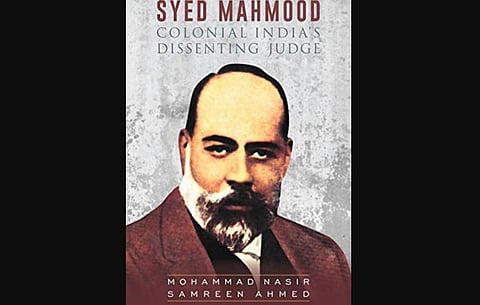

These two hundred pages on India’s first Muslim judge of Allahabad High Court who dared to dissent and chose to resign from the high chair of Judiciary, instead of prostrating before the British rulers, are a thoroughly researched account of a legend and an institution builder.
'Syed Mahmood Colonial India’s Dissenting Judge’ by Mohammad Nasir and Samreen Ahmed shares positive and negative details of Mahmood’s life and work, while offering valuable insights into a time when the British Colonial rule, after the turbulence of the 1857 uprising, was trying to gain popular acceptance and building bridges of trust.
Within 53 years of his short lifespan, Mahmood, son of Sir Syed Ahmad, not only acquired skills of Arabic, Persian, Sanskrit, English, Latin languages, but also went on to complete an education in law, qualifying to be a barrister after earning a degree from Christ’s College at Cambridge University. When he joined Indian Civil Service as a district judge in 1879, he had already written a commentary on the Indian Evidence Act and had laid the foundation of the Mohammadan Anglo-Oriental (MAO) College that led to the establishment of Aligarh Muslim University.
His achievements in the field of law, jurisprudence and education, particularly that of Muslims, have to be read to be believed. He was an intellectual, rather a genius, who rose to become the first Muslim and the youngest judge of a High Court under the British Empire in India. In fact, at the time, it was the highest rung of the judicial ladder in British India.
Mahmood, through his “dissents, became a shredding machine of the colonial judicial convention of conformity with the British judges”, and when forced to fall in line, he also had the courage and conviction to resign from the coveted chair, insisting on his independence and equality as a judge among equals.
He refused to be mistreated by Chief Justice Sir John Edge who was hell-bent on disciplining a principled dissenting colleague through bureaucratic means. In his short tenure of six years as the High Court judge and 14 years of judicial career, Mahmood managed to successfully usher in a “synthesis between ancient Hindu and Mohammedan laws and the common law imbued directly or through statutes from England”, which went on to become texts and many of his judgements continue to be landmarks in India’s judicial history and practice. Even his dissenting judgments are treated as fundamentals of today’s acts and laws across the world.
“To import foreign ideas and bring them to bear upon interpreting Sanskrit texts when modes of interpretation sanctioned by Hindu logicians of the highest authority are forthcoming is an obvious error,” Mahmood had observed, reflecting his integrity and comprehensive command.
Apart from his professional achievements, his personality was versatile with his feet firmly grounded, working to erect pillars of judicial freedom, empowerment through education and tolerance on which the ‘Idea of India’ evolved during the freedom struggle and became enshrined in the Constitution.
In today’s climate of rising intolerance and religious bigotry, Mahmood stands out as a man of faith and interfaith, whose wisdom is reflected in his assessment of the Mughal empire. “What was it that made the reign of Akbar so illustrious and prosperous... whose armies were far lesser than he (Aurangzeb) mustered...”, he poses a query and goes on to answer it himself––“the power of moral causes he entirely ignored, the feelings of his subjects he did not consult”.
In Mahmood’s estimation, “Aurangzeb was a bad politician––his statesmanship relied for its success on marital discipline and physical force; he failed to appreciate the potential of ‘amicable modes’ that were relied upon by his ancestors, especially Akbar in administration”.
The authors of 'Syed Mahmood: Colonial India’s Dissenting Judge' have done a commendable job of presenting his life and achievements to a generation that remains oblivious to contributions of ancestors. But the two have also been conscious of not turning the book into a eulogy. They do not omit or overlook Mahmood’s frailties such as his indulgence for alcohol that possibly ended his illustrious life prematurely.
Biographies either turn out to be hagiographies or sometimes become indispensable sources of history. This one surely proves to be the latter.
Syed Mahmood: Colonial India’s Dissenting Judge By Mohammad Nasir, Samreen Ahmed
Publisher: Bloomsbury
Pages: 274
Price: Rs 699